Selling a Million Books: What Worked for Us (and Can Work for You, Too)
As you may know, Angela and I have recently reached the unbelievable milestone of having sold a million books.
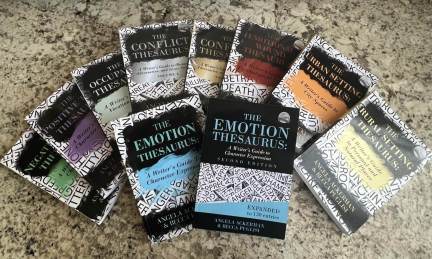 Meet the kids
Meet the kidsI say ���unbelievable��� because this was never in our sights. We started out as two writers with no formal education in the field. We had no publishing experience. What did a couple of stay-at-home moms really know about succeeding as authors?
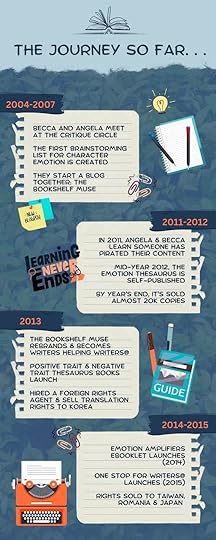

Needless to say, when we sold our thousandth book in 2012, we were over-the-moon excited. And then we hit the 10,000 mark. Then 100k��� With every milestone, people asked us how we had done it���because I think a lot of writers can relate to our feelings of uncertainty, of having a goal but not knowing how to get there, and not wanting to dream too big.
But here���s the truth: if we can succeed, you can succeed. Full stop.
Granted, it would have been easier with a little more information when we started. So we���d like to share some of the things that have worked for us, because we believe they can work for you���no matter what you���re writing or what goals you���ve set for yourself.
Give the Readers What They WantSome of you may not know that the very first thing we blogged about in 2007 was The Emotion Thesaurus. As critique partners, we had both struggled with how to show emotions in new and realistic ways, and we knew it was also a problem for the other members of our group. So we thought: maybe this is something other writers need help with, too.
That suspicion was confirmed almost immediately. We started putting up a new emotion post each Saturday, and our readership just blew up. Before long, people were asking for the content in book form. And that���s when we knew we had something people wanted to read.
Takeaway: Whether you���re writing nonfiction, cozy mysteries, thrillers, steamy romances, or a memoir, you have stories that people want to read. Write what excites you. Hone your craft so you can write those stories well. And start building connections with the people who want to read what you���re writing.
Take RisksAngela and I had always dreamed of being traditionally published, so when it came time to turn The Emotion Thesaurus into a book, we assumed we���d go that route. Then we started seeing our thesaurus content popping up on other people���s sites, and being distributed as a PDF. Suddenly, we couldn���t afford to wait two years or more for our book to be available; we had to get it out quickly before someone else did, and that meant publishing it ourselves.
But this was 2011. Self-publishing was openly poo-poohed in the industry, with many people bemoaning the substandard quality of self-pubbed books (and some asserting that authors only went this route if they couldn���t get a traditional contract). Oh, and we had zero idea how to publish a book. Going down this path was a huge risk for us, but Ange and I knew we needed to do it, so we got to work figuring out file formats, and distributors, and cover designers, and the logistics of co-authoring a book. And we made it work, and in 2012, we launched The Emotion Thesaurus.
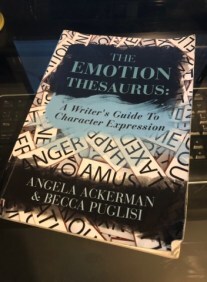 Original proof, pre-logo
Original proof, pre-logoTakeaway: Don���t be afraid to take risks with your writing. Try new things. Dive into uncharted waters and educate yourself. Sometimes, the scariest opportunities have the biggest payoffs, but you won���t reap the rewards if you don���t try.
Put Your Own Spin on Your WorkAnother thing that made us nervous was the unconventional format of our books. Instead of the typical narrative structure, our thesauruses consisted mostly of two-page entries full of lists and phrases. It was a risk to deviate from the norm, but we went for it because our blog readers liked it.

Not only did readers love the ���user-friendly��� structure, other writing books with lists soon began popping up all over Amazon.
Unfortunately, it’s also led to copycat covers and many books that have similar titles to those in our series. We feel bad every time someone tells us they bought a book they thought was one of ours only to discover it wasn’t. So if you are trying to find our thesaurus guides, just look for the Writers Helping Writers�� logo.
Takeaway: Always put your own spin on your writing. Infuse it with your unique voice. Explore the themes that interest you and the subject you���re passionate about. Write as your authentic, one-of-a-kind self and you���ll end up creating books that will stand apart from the others in your genre.
Make Your Books Available to as Many Readers as Possible
Because readers have their own preferred storefronts and formats, we wanted to reach as many of them as possible by going wide and making our books available in lots of places. We also offered PDF versions, since people like having their book files open on their computer while working. We even created a Character Traits Boxed Set to sell directly from our website.
The bulk of our sales do come from Amazon, but by distributing through many digital storefronts and independent bookstores, and making our books available in PDF, we ensured that readers could get our books where they liked to show and in the format that worked best for them.
Takeaway: Make it easy for people to buy your books. Sell through multiple distributors, in different formats. Listen to what your followers are saying about how they like to read and make those options available to them.
Explore Every OpportunityAs you grow, opportunities are going to come along that you never considered. Ange and I had published three books and were working on the fourth when we got an email from a publisher asking if the Korean rights to The Emotion Thesaurus were available. Foreign translations weren���t on our radar at all. We didn���t have an agent, couldn���t negotiate an international contract ourselves, and couldn���t market a book overseas if we wanted to. So it would���ve been easy for us to dismiss the request as being too far outside our wheelhouse and something we just didn���t have time for.
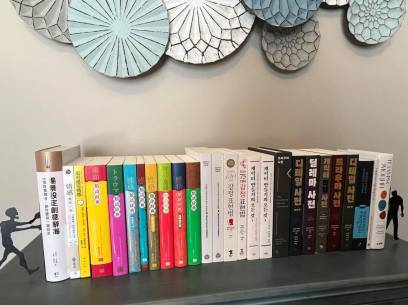 Foreign editions (and Angela’s zombie bookends)
Foreign editions (and Angela’s zombie bookends)Instead, we looked into it. We found an agent who specialized in negotiating rights deals with foreign publishers. We talked to her about the email we���d received, and we realized this was a gift that had fallen into our laps. So we sold those rights. And, boy, was that the right decision. We now have books in 9 languages that have sold almost 400,000 copies to date in markets we never would have reached on our own.
Takeaway: No matter how busy you are, explore every opportunity that comes your way. You don���t have to invest a ton of time. Just do some basic research, keep an open mind, and see if it���s something you should pursue. When in doubt, see Point #2.
Run ExperimentsIt can be hard to know if an opportunity is a good one or not. In those cases, it doesn���t hurt to experiment.
In 2018, KDP started contacting us with requests to highlight our Kindle books in their daily and monthly deals. We were skeptical about how this would affect our sales. Sure, more people might buy our Kindle book if it was priced at $1.99. But wouldn���t we end up making less money that way? Would those discounted sales cannibalize our paperback sales?
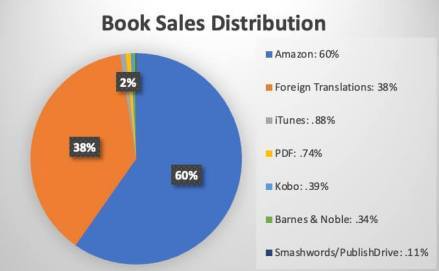 Writers Helping Writers series breakdown 2023
Writers Helping Writers series breakdown 2023So we ran an experiment and started participating in those deals. It became clear that while we made less per book, our revenue still increased. Why? Because it lowered the barrier to test out one of our thesauruses, and if the person found it helpful, they often would go on to pick up more volumes in the series. Also, because we have observed our readers prefer print to digital, some kindle deal buyers would go on to pick up a print copy also. So this experiment has really paid off for us.
Takeaways: New opportunities don���t have to be permanent. If you���re not sure about something, set aside a prescribed period of time to test it out. Setting a timeline and recognizing that the experiment is temporary can ease your mind about trying new things.
Know When to Cut BaitBut remember that not every experiment is a success. Prior to 2019, we hadn���t utilized ads on any platforms. Sales were flagging a bit at Amazon and a lot of people were finding success with ads there, so we decided to give it a shot. After eight months, we realized that the investment just wasn���t paying off, and we stopped.
Takeaway: Accept that some experiments won���t pan out. Keep a close eye on those trial runs and the risks you���ve decided to take. And do the same with your day-to-day tasks���you know, the processes and systems you���re using because that���s the way you���ve always done them. Be deliberate about monitoring what you���re doing and assessing if it���s worth the ROI. If it���s not working, stop doing it or find a new way.
Seek Out Multiple Revenue Streams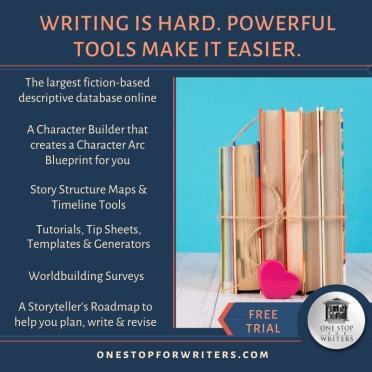
Let���s face it: it���s hard to make a living from book sales. But Ange and I learned early on that our skills as writers lent themselves to other ways of bringing in money. So we branched out as speakers, running workshops for local writing groups and at larger conferences. Then we explored another collaboration that resulted in One Stop for Writers, a subscription-based website that contains all our thesauruses (not just our books) and writing tools and resources designed by us that help writers in a new way.
Workshops and One Stop for Writers have provided additional revenue for us in and of themselves, but they also generated more sales by introducing us to new people who had never heard of our books.
Takeaway: What additional career opportunities could you pursue that utilize your writing skills? What else could you be doing ���on the side��� while you���re writing books? Here are some options you may not have considered.
Partner with the Right People
If there���s any one secret to Angela���s and my success, it���s that we found each other. It���s really, really hard to do this job alone. I can���t imagine having to handle everything by myself. At some point, most writers will need to partner with other people, be that a business partner, editor, agent, cover designer, copy editor, bookkeeper, etc. Those partnerships can save you���as long as you choose wisely.
Takeaway: Research potential partnerships carefully. Look for people who complement you, people who are strong where you���re weak. Find people who share your values and work ethic and are pulling in the same direction.
There’s more we could share, but this post is long enough already, and we’d rather hear what has worked for you. Let us know in the comments!
More quick facts about the books
Enter our celebratory giveaway
The post Selling a Million Books: What Worked for Us (and Can Work for You, Too) appeared first on WRITERS HELPING WRITERS��.
Writers Helping Writers
- Angela Ackerman's profile
- 1015 followers



